Presidential Debates: Neither Debates Nor Presidential
Do we place too much importance on performance in presidential debates?
Ethan Gach throws a bit of cold water on all the talk about Rick Perry’s debate performances:
It would be hard to defend the position that a candidate’s stage performance is completely irrelevant. After all, a lot of the presidency is about how one appears publicly, both in domestic and foreign settings. But placing so much emphasis on televised debates, of which there have already been several, sometimes only weeks apart, where often the same questions are asked, and nearly the same answers are given, begs the question: isn’t there a better way to spend time evaluating candidates?
[…]
The implicit assumption here is that one’s ability to “get off a one liner” is some how related to his ability to negotiate effectively with world leaders. Will he be calling them names? I don’t get it. Nor does one’s ability to “quickly understand the issues at play in a complex and unexpected crisis” have any obvious connection with one’s ability to deliver effective sound bites or memorable policy panders.
I’m not claiming that Rick Perry is prepared to be President of the United States. But it’s distressing that so many respectable people keep pointing to Perry’s unsuccessful primetime debut as if to say, “hey, if he can’t utter a bunch of boilerplate nonsense in front of Cooper & Co., how will he know what to do about Iran’s development of nuclear weapons?!”
This is actually a really useful point. Many of us have pointed out time and again that the presidential “debates” aren’t really debates at all–they’re, at best, serial press conferences and at worst political reality television. But the more important thing is missed: they really don’t tell us much about being president, either.
To be sure, these performances can tell us something about how much time the various candidates have spent over the years developing a knowledge of public affairs. We’ve learned that a lot of governors, especially, have next to no interest in national and international affairs and are desperately trying to play catch-up when they suddenly take that gigantic leap to running for president.
Likewise, while being president is mostly about making good decisions in quiet reflection after sifting through a lot of staff work that’s made its way through the interagency process–almost the opposite of what we test in these “debates”–it is awfully useful to have substantial native intelligence, good humor, and thick skin. The “debates” can shed some light on these qualities, mostly in revealing lack of same.
Mostly, though, people remember one-liners and gaffes. “Are you better off than you were four years ago,” “There you go again,” “I am not going to exploit for political purposes my opponent’s youth and inexperience,” and “You’re no John Kennedy*” were all memorized lines, quite probably written by someone else. And the ability to smoothly recite them at the critical time has next to nothing at all to do with being an effective president.
For that matter, neither did Michael Dukakis’ hamhanded inability to handle a gotcha question on capitol punishment or George H.W. Bush’s looking at his watch during a tediously stupid townhall meeting. But they have an enormous bearing on a campaign.
____________
*Yes, I know this was from a vice presidential debate. But it’s perhaps the most-riffed debate line ever and likely the least fair.
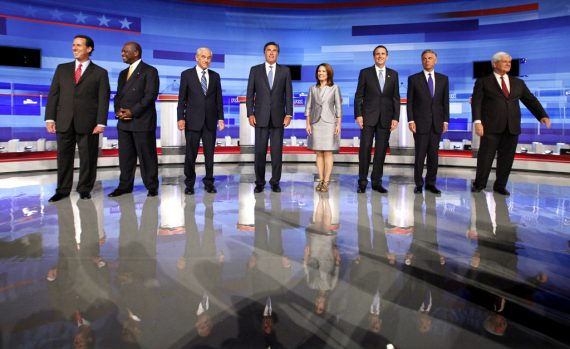

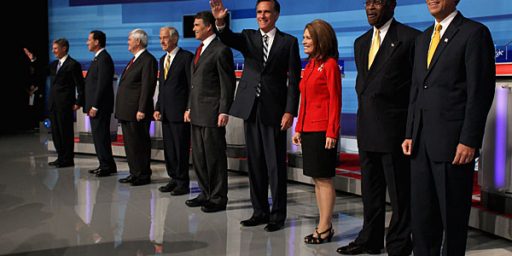
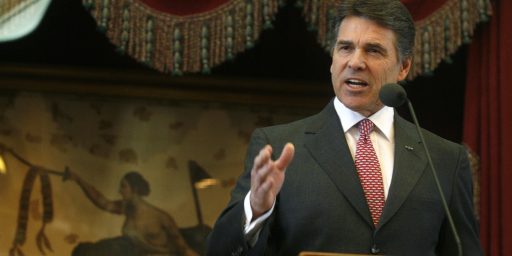
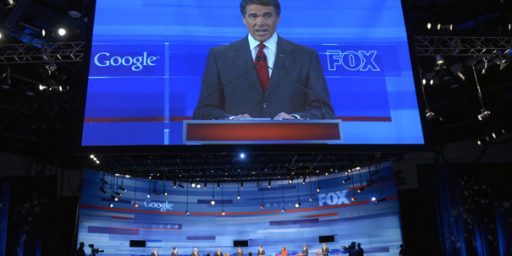
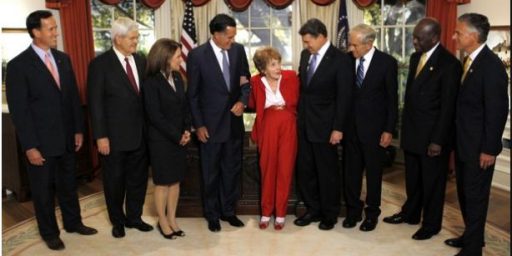

You are correct – tabloid television made for the cable infotainment networks. Obama’s “last one on the Island” joke was more appropriate than even he realized.
This is all very true.
At the primary level., there are usually too many candidates on the stage for there to be meaningful exchanges even over a two hour period. As we learned during the 2008 campaign, though, once the number of candidates gets whittled down, things tend to get interesting. The last few debates between Hillary Clinton and Barack Obama were actually pretty good, I thought. But you can do that with two candidates and 90 to 120 minutes of television time.
The problem with the General Election debates is that they’ve been entirely co-opted by the two parties. The “Commission on Presidential Debates” is largely a sham designed to ensure that whatever debates occur take place in a controlled environment designed to ensure as few opportunities for “gaffes” (i.e., moments of honesty) as possible. It wasn’t always that way. As recently as 1980 and 84, I believe, the debates were sponsored by the networks and the League of Women Voters or some such organization.
I see them as offering three things:
1. They’re a “leveler” in terms of public exposure. All the candidates get free publicity for participating in the debates, and they get a chance to hit at the leading candidates without having to spend X millions of dollars on television ads.
2. They put the candidates in a position where they have to answer questions about their past, political decisions, policy views, etc. They can’t hide behind their press secretaries, or only go to friendly public events.
3. This is more speculative (fellow Poli Sci majors are free to prove me wrong), but they have influence among the more politically involved people who vote in primary elections and participate in campaigns.
@Brett:
I agree with you here. Which I why I generally don’t like when debate sponsors attempt to exclude candidates in the early stages of a primary race. Of course a candidate like Gary Johnson isn’t going to rise in the polls if he never gets a chance to stand next to the other candidates and introduce himself to the public. What happens after that, is up to the people and the candidates
“But the more important thing is missed: they really don’t tell us much about being president, either.”
Frankly, NOTHING tells us that much about how someone could handle the job of President. I mean, was there really anything in Dick Cheney’s entire public life that would have made anyone think he’d go so far off the deep end as Veep? Given that, what better way is there to evaluate a candidate’s brains and guts than to put them in the highest pressure, highest stakes situation we can? If you wanted to visually depict George W. Bush’s weaknesses as a President, wouldn’t starting with that astonishingly bad debate against Kerry be a pretty good example?
Mike
These debates are arranged and set up. The candidates are too controlled and third parties are almost always left out: George Wallace, Nader, and several others over the years. Everything is controlled and the reasons are obvious.
Replace debates with professional wrestling matches?
I always get kicks when candidates complain about the reality TV flavor of these debates.
In 2007-2008, Charlie Rose offered a full hour of his program to any candidate who wished to appear. Hardly any of them volunteered.
I get the same kicks when pundits, including OTB, have these complaints.
I have seem tons of posts about Palin’s antics, Bachmann’s antics, Perry’s antics and now Cain’s antics. Jon Huntsman’s policy positions? Not so much.
I’d opt for a Survivor style of debate. Drop the candidates on a deserted island. Whoever survives the longest, wins. Of course, this might be more Lord Of the Flies instead of Survivor, but I’m okay with either result. Imagine the general election ads this would generate:
“He/She survived on grubs and shark excrement while simultaneously eliminating the competition with a homemade ballista. This man/woman can jump start the food industry AND scare the bejesus out of our enemies.” [I’m -insert candidate here- and I approve of this message.]
@Murray: It’s not a complaint so much as an analysis. We have the system we have partly because candidates tend not to want to get cornered on lengthy substantive debates, partly because the media sponsors think “reality TV” is more likely to attract an audience, and probably other reasons that aren’t occurring to me. Pundits comment on the news cycle, which the “debates” are a major part of.
I really like Huntsman from what I’ve seen so far but lengthy analysis pieces on his policies are about as interesting as a discussion of how many angels can dance on the head of a pin. He’s simply not a viable contender for the Republican nomination because people like me make up too small a fraction of the Republican nominating electorate. So, Huntsman is treated as a footnote, as a horse in a race, or as a meta symbol for the state of things rather than as a serious presidential candidate.
Political debates in this country are worse than useless. For the most part, they are about each candidate doing his or her best to spit out their prepared soundbites while sounding confident.
James – I, for one, would be interested in a post on Huntsman’s proposals. I’ve read about a plan of his a while back and frankly it sounded like GOP boilerplate to me, but I’m willing to consider the possibility that he’s an actual thoughtful (“wonkish”) guy with real ideas. Sure, he’s got no chance at the nomination. That doesn’t mean the ideas aren’t worth talking about.
You have an audience here that probably will be interested in such things. I’d hazard a guess that a substantial chunk of your audience would be thrilled to find out that there is a GOP politician who is serious about policy as policy (rather than “policy” as campaign fodder) and whose numbers actually add up. Huntsman appears to be angling for a “reasonable Republican” branding. Ok, let’s see about that. Is he?
@Rob in CT: Fair enough. I’ve been swamped of late and also operating under considerable sleep deprivation, so my production has been way down. I’ll try to work more of that sort of thing in.
No worries. At your leisure. I’m just saying I think you have the audience to support a post on substantive policy (I think you knew that, but it bears repeating occasionally).
Get some sleep. Then do a Huntsman policy post. 🙂
When did having thoughtful policy positions rather than soundbites become “wonkish”?
No wonder the US is going down the drain. We’re amusing ourselves with politics cage matches rather than deal with reality.
@physics geek: I like the way you think.